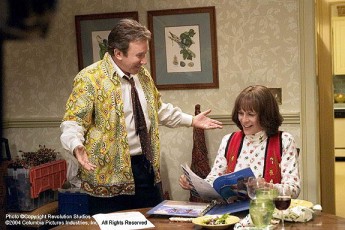|
Christmas
With The Kranks
Tim Allen and Christmas are quickly becoming synonymous.
Starting with his turn in The
Santa Clause it would seem that Allen has caught
the Christmas bug, big-time.
This
time around, Joe Roth helms the Chris Columbus penned adaptation
of John Grisham’s novel “Skipping Christmas,”
a title that was likely dumped to avoid confusion with the
Ben Affleck holiday snoozer Surviving
Christmas.
Instead
we get Christmas with the Kranks. Cue the chuckles.
Distancing
itself from the Box Office atrocity that was Surviving
Christmas was inevitable, but it’s still a shame
that Grisham’s original title was dumped because after
screening the film, “Skipping Christmas” is
much more in sync with the themes at work here. Yes, this
film has credible themes.
The
concept is pretty straightforward. After saying goodbye
to their daughter Blair (Julie Gonzalo), who is off to join
the Peace Corps in Peru, Luther and Nora Krank (Tim Allen
and Jamie Lee Curtis) decide to avoid the inevitable depression
of a “Blair-less” Christmas by taking a cruise
in the Caribbean instead.
How
can this be done with the costly Holiday season looming
overhead? Luther crunches the numbers and discovers that
they could actually save money if they were to skip Christmas
and go on the cruise instead.
Easy,
right?
Not
so. The film does a decent enough job pulling us into the
Krank’s plan to skip the holiday season, so much so
that we find ourselves rooting for them to pull it all off
when co-workers, neighbors, and even members of the clergy
raise their eyebrows in scorn. It does sound selfish, but
isn’t the break deserved? In
a free country, shouldn’t someone be able to go one
holiday season without the ritual expenses that our society
imposes upon everyone? These questions are raised and effectively
hook us onto the Kranks’ side of the battlefield.
Roth
develops the families in Luther and Nora’s cul de
sac as near fanatics of a “Frosty-clad Christmas”
cult led by the imposing neighborhood dictator, Vic Frohmeyer
(Dan Aykroyd). M. Emmet Walsh plays Luther’s codgy
neighbor who knows just how to ruffle his feathers at the
opportune time for maximum irritation, and it’s a
pleasure to watch.
We are
meant to feel for the Kranks, as they only desire to skirt
their sorrow and enjoy some much deserved time alone, and
Roth does a decent job setting this all up. One benefit
could have been showing us exactly what a usual “Kranks
Christmas” is like, so that we can appreciate the
scope of their annual celebration and why it is such a big
deal to everyone else that they want to skip the holidays.
The
neighborhood dilemma is an understandable one, as the desire
for total participation in décor is a primary focus
for some. Some might even go so far as to call it an obsession.
This
aside, the film draws our sympathy and the statement regarding
the commercialism of the season is clearly defined. That
is, until Luther takes it a few steps too far.
It all
begins with a total boycott, just to be fair. Christmas
cards aren’t ordered and the Boy Scouts are denied
the sale of a Christmas tree at the Kranks’ residence.
By the time Luther ices his walkway to deter carolers and
spends his saved holiday ducats on tanning sessions and
botox, we realize that the pendulum has swung the other
way, and the Kranks have switched from heroes to villains.
What
ensues is the expected holiday comeuppance. Blair announces
that she is coming home to introduce her new Peruvian fiancé
to a Kranks style Christmas and the wheels are set in motion
to pull off a holiday miracle.
Don’t
blame me for spoiling here, because this is all set up in
the trailer, folks.
Knowing
all of this going into the film leaves little left to discover,
and it nearly ruins a genuine payoff at the close of the
third act. Sure, the race to the clock is funny at times,
but it is also the same tired holiday shenanigans we’ve
seen before, until that payoff.
Boy,
is it a doozy. Truthfully, I haven’t seen a holiday
film that seemingly caters to the commercial spirit of the
season wind down in such a way.
Some
will accuse the resolution of being schmaltzy, and they
may be right to an extent, but it works. Roth and Columbus
clutter the third act narrative so full of potential plot
developments that the actual resolution gets overlooked
as a possibility long enough for it to sneak up and catch
us by surprise.
There
is absolutely no posturing involved in its execution either.
In fact, there isn’t even a declaration of wrong or
the intent to correct ones ways. We get only the simple
act in its most basic and moving form. Seemingly unmotivated,
it’s a gesture that feels so right that it usurps
nearly every flaw in the film.
Nearly.
Rating:

|







